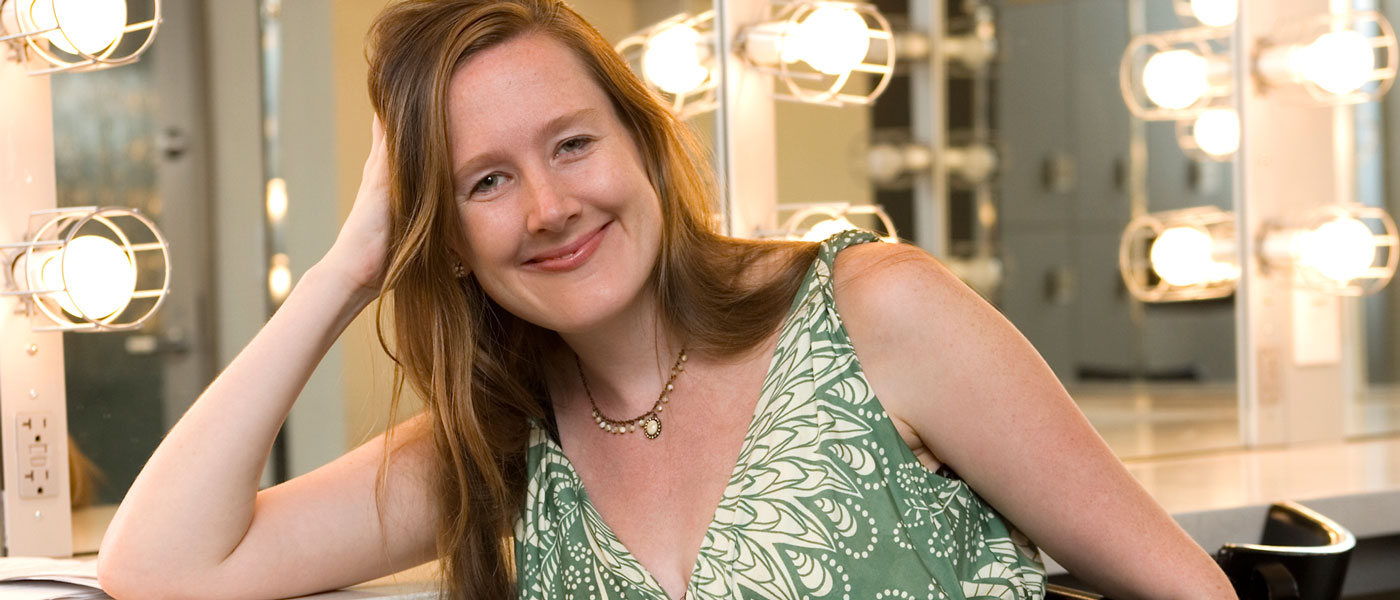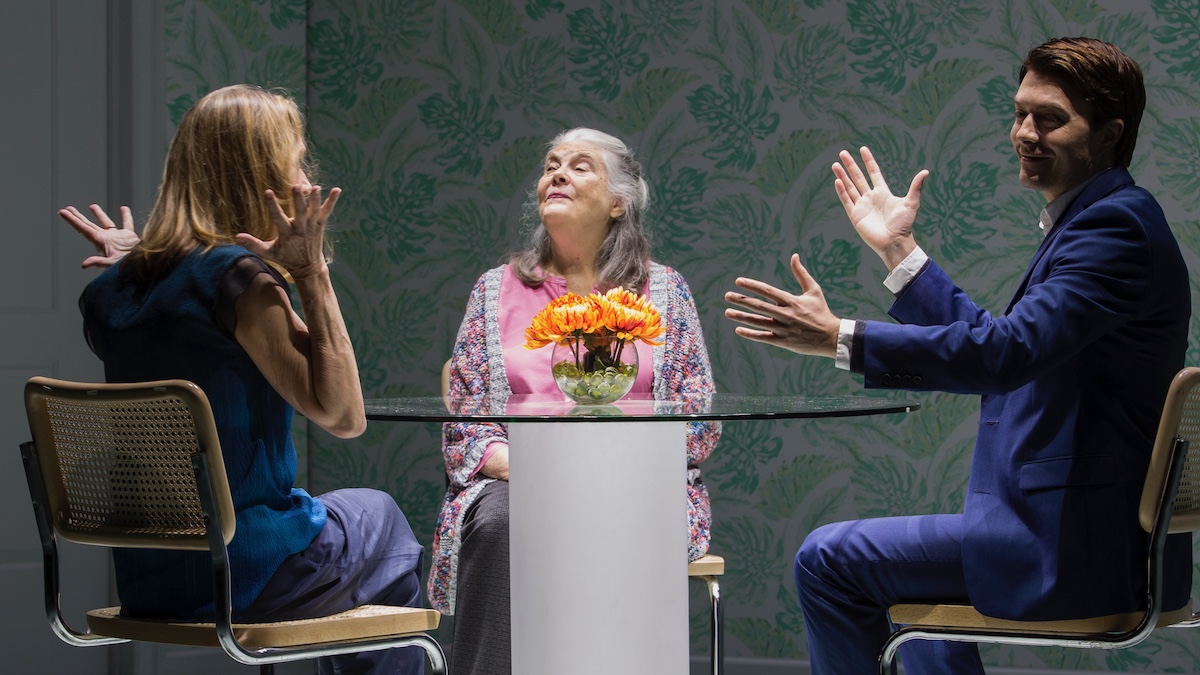
This past Monday, Sarah Ruhl received the 2016 Steinberg Distinguished Playwright Award, presented by the Harold and Mimi Steinberg Charitable Trust. The prize included a $200,000 cash award and is one of the largest of its kind in the theatre industry.
Samuel French was particularly proud of Sarah, especially since she was honored last month at the 2016 Samuel French Awards, receiving the Award for Sustained Excellence in American Theatre. (Be sure to check out the Samuel French Awards Series, which chronicles Sarah’s influence on the American theatre.)
Below, we’re thrilled to share Sarah’s remarks from this past Monday night at the Steinberg Awards.. Don’t miss this read.
Thank you so much. I am so honored, and humbled, and happy to be with you all tonight. Thank you so much to the Steinbergs for their wild, uncommon, extraordinary generosity. The reason I write plays instead of poetry is simple—it’s for actors—so I can hear them sing prose and vault it up into the ether, making it into poetry. So, thank you so much to all the actors who came tonight and performed, and to Todd London and James Bundy for speaking. Your eloquence and friendship are a gift.
I wrote a joyful speech two weeks ago in preparation for this evening. In light of the election, I found my mood had changed. Maybe your mood has changed too. As my friend and mentor Paula Vogel texted me the morning after the election, “The color of the world has been bleached.”
My playwriting students have been writing me this week, asking me questions like: “Why do we write now?” And “What do we do?” We write for the same reason we always write, but with new urgency. We write to extend the light of our minds into dark hollows. We write to create and model empathy in a ragged land. We write because our minds can always be free in the face of tyranny. We write to make our minds known to other, different minds. We write with the hope that we may understand other, different minds. We write to produce knowledge in the face of ignorance. We write because we must.
Secondly. “What do we do?” We sing full throatedly, and we support the free speech of our friends. We reject the art of cruelty. When it seems that the country has had a referendum on values like culture, kindness, and common decency—and said we choose none of these…what can the artistic community do but insist on modeling culture, kindness and common decency. We demonstrate with our theatrical practice that, in artistic and other democracies, we are completely dependent on one another.
I wanted to be a writer from a young age, and before my father died, when I was twenty, he warned me about the dangers of solipsism associated with the writer’s life. He knew I wanted to be a writer, but he did not know I would be a playwright. My father wrote me a letter when he was ill with cancer, warning me against an excessively inward literary life. He wrote: “Continue to give yourself to others because that’s the ultimate satisfaction in life, to love honor and respect others.” (I plucked that sentence and put it in my play Eurydice.) Were my father here tonight he would see that (though his worry about inwardness may apply generally to writers) the life of the playwright is protective. He could look into the audience and see that the playwright’s livelihood depends for its life-blood on having affection for others. Always the life force of others gets poured back into the work.
So, to my students who are writing to me, saying: “What to do?” I say: Find each other. Don’t sit in your own room. Find the common room, which is called grace, which is called a theater. This room is also our country, and we all belong here. To be in a room where poetry matters, to be in a room where not everything can be monetized, to be in a room where culture and valor might have something to do with one another…Dig in your heels and stay.
One reason this award is rare and moving to me is its insistence on the whole life cycle of the writer, and its hope for a playwright’s longevity and duration. Duration, that unsexy thing—the turtle, not the hare. A writer who endures–not sexy. And a woman writer who endures? What even is she? I remember the time Lynn Nottage, Theresa Rebeck and I were on the cover of American Theater Magazine together. This little man—a photographer–jumped up and down taking our picture—saying, “smile with your eyes, not with your mouth, we need more skin, ladies, this is an all female issue, we want to see your bare arms.” Theresa Rebeck stared at him and put on a cardigan.
What allows a woman writer, or any writer, to endure? I want to see what Julia Cho and Branden Jacobs-Jenkins and Lin-Manuel Miranda and Quiara Hudes and Lynn Nottage are writing when they are seventy two. But how do we endure? Here is my advice to wayward writers who want to endure in this rocky profession—marry my husband. But I know you cannot all marry my husband, even though I am working on a play about polyamory for Lincoln Center. My other piece of advice to young writers…study with Paula Vogel. Then, make your own pickle council. What is a pickle council? Mine is a group of playwright friends who meet once a month to share work, sometimes eat pickles, sometimes tell pickles, and keep each other in good spirits about the fickleness of the theatrical, personal, and political gods.
And so I call upon the gods of endurance to protect all of us and give us hope. The gods who allow art to flourish during tyrannical regimes through the pursuit of metaphor—think of Ionesco, Brecht, Havel, Fugard, Boal. The gods of endurance who keep us writing not just during regime change but also during life’s other cruelties. The gods who kept Maria Irene Fornes writing when she was battling Alzheimers. The gods who helped Horton Foote write every single day when he was all but ignored in New York. The gods who urged Tennessee Williams to write his late work despite the critics’ revulsion, who inspired August Wilson to move to Seattle away from the madding crowd to write his extraordinary body of work, who listened when Beth Henley wrote a new play to give herself hope after her mother was murdered in Mississippi. Gods of literary and theatrical endurance, we pray that you give us wayward, nomadic writers strength, and even stubbornness. The stubbornness to create, the gentleness to listen—in short, fortitude. We need our poets and comedians, now more than ever.
Now, a side-note. On the morning of the day when I heard about this award, I realized I was about to bounce a check I’d just made out to my baby-sitter. Walking to the bank to get her a money order, I thought, oh dear. That afternoon, on the phone, I learned of this award and wept with joy and surprise. Lewis Hyde wrote in The Gift, “A gift that cannot be given away ceases to be a gift.” The same is true of a play. In that spirit, I want to give a small portion of this gift to help establish a fund for playwrights who find themselves in need of child-care while they work on a new play. I’ve been very lucky to have had support during crucial times in my artistic life when I was stretched between theater and motherhood; I know others have not been so lucky. I dream of a theater (and a country) where productivity and love are in service of each other, not at war with each other. I believe this starts with child care. I’ve partnered with the amazing Lily awards and New Dramatists to make this happen, and I thank them for their help with this endeavor.
Before I close, I want to thank a few more people who have brought me to this moment. I often think during awards season that artists don’t really want to compete with each other; they merely wish to thank the people they love in public; ironically, in order to get to that place of gratitude, they have to triumph over other artists they love. I’m grateful that this award doesn’t involve that kind of winning. I want to thank Andre Bishop and Lincoln Center for being my home away from home. I want to thank my teachers (in particular, that goddess of generosity, Paula Vogel), my students who inspire me, my fellow writers, collaborators and friends who keep me aloft. All of you tonight here made me a playwright and continue to make me a playwright. I want to thank my mother who taught me to love plays; my husband, who taught me to love life, and my children—Anna, William and Hope. May you shine. Thank you.

A Children’s Theatre Classic: An Interview with Snow White And The Seven Dwarfs Composer Michael Valenti

Inspired by True Events: A Conversation with Playwright Ryan Spahn

